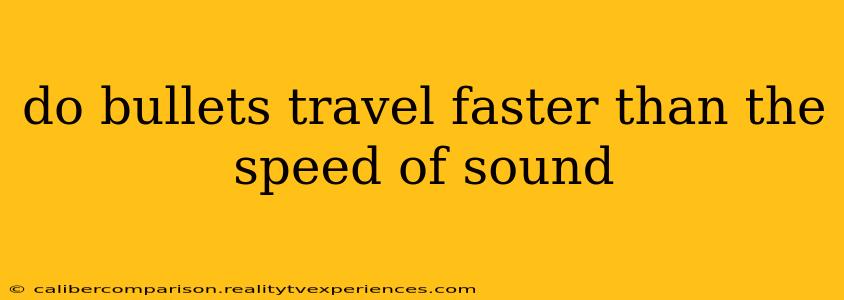Do Bullets Travel Faster Than the Speed of Sound? The Physics of Supersonic Projectiles
The simple answer is: yes, some bullets travel faster than the speed of sound. But it's not as straightforward as a simple yes or no. The speed of a bullet depends on several factors, making the answer nuanced and fascinating from a physics perspective.
Understanding the Speed of Sound
First, let's clarify what we mean by "the speed of sound." Sound travels as waves through a medium (like air), and its speed varies depending on factors such as temperature, humidity, and altitude. At sea level and room temperature, the speed of sound is approximately 767 miles per hour (1235 kilometers per hour or 343 meters per second).
Factors Affecting Bullet Velocity
Several factors influence how fast a bullet travels:
-
Caliber: Larger-caliber bullets generally have more mass and thus require more propellant to reach high velocities. However, this isn't a direct correlation; a smaller, lighter bullet can be propelled to higher speeds with the right propellant.
-
Propellant Charge: The amount of gunpowder used directly affects the bullet's velocity. A larger charge results in a faster bullet.
-
Barrel Length: A longer barrel allows more time for the propellant gases to accelerate the bullet, leading to higher muzzle velocity.
-
Bullet Design: The shape and weight of the bullet also influence its speed and aerodynamic stability. A streamlined, aerodynamic bullet will experience less air resistance and maintain its velocity longer.
-
Environmental Conditions: Similar to the speed of sound, factors like air density (affected by altitude and temperature) and wind resistance influence a bullet's speed and trajectory.
Supersonic vs. Subsonic Bullets
Bullets are categorized as either supersonic or subsonic based on their velocity relative to the speed of sound:
-
Supersonic bullets: These exceed the speed of sound, often creating a sonic boom – a loud bang caused by the shock wave generated as the bullet breaks the sound barrier. Many high-powered rifle rounds are supersonic.
-
Subsonic bullets: These travel slower than the speed of sound. Subsonic ammunition is often preferred for situations where minimizing noise is crucial, such as hunting or tactical situations.
Measuring Bullet Velocity
The velocity of a bullet is typically measured in feet per second (fps) or meters per second (m/s) at the muzzle (the end of the gun barrel). Specialized equipment like chronographs is used to accurately measure this velocity.
Conclusion
While not all bullets are supersonic, many commonly used cartridges propel bullets at velocities significantly exceeding the speed of sound. The specific speed depends on several interrelated factors detailed above, making it a complex interplay of physics and engineering. Understanding these factors provides a more comprehensive understanding of firearms and ballistics.

